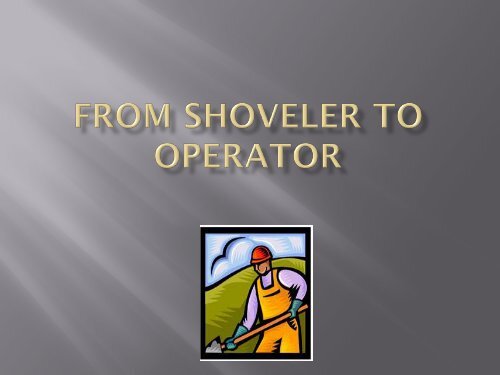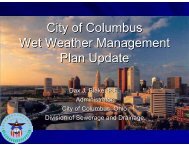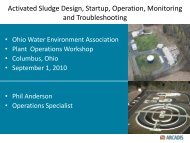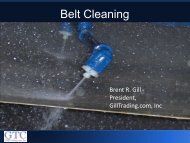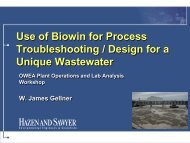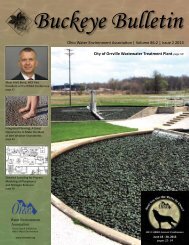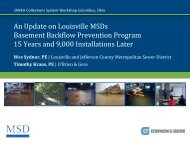FROM SHOVELER TO OPERATOR
FROM SHOVELER TO OPERATOR
FROM SHOVELER TO OPERATOR
Create successful ePaper yourself
Turn your PDF publications into a flip-book with our unique Google optimized e-Paper software.
• Been with the City of Bowling Green for 8<br />
years as a operator/maintenance person.<br />
• Class 3 wastewater license<br />
• Northwest Section OWEA Operations chair<br />
• Member of the Wastewater Rangers operations<br />
challenge team.
• By definition a operator is someone who<br />
oversees plant operations, checks equipment,<br />
and performs lab tests.<br />
• A lot of time this does not hold true. Some<br />
aspects of this definition are overlooked.
• In the early stages of being a operator I was<br />
content with the everyday mundane job. I had<br />
the stable government job with good benefits<br />
and retirement so I had no complaints.<br />
• So if they wanted me to be the…….
• Just remember there is a lot of comfort at work<br />
when other people are around.<br />
• It is very easy to get the “I don’t care someone<br />
else will take care of it” attitude.
• After three years of being a yard worker /<br />
sludge hauler it was my turn to be a shift<br />
operator.<br />
• This may not sound like a big deal but I had no<br />
clue on how to run a WWTP.
• What type of plant we had.<br />
• What does high flow mean again?<br />
• Who do I call if there is a problem?
• Don’t change anything, this is how we have<br />
done it for years.<br />
• If this happens do this.<br />
• Don’t think outside the box, do as your told.<br />
• Don’t be proactive, just reactive.
Here comes the<br />
storm!!!!<br />
• On the first night a huge<br />
thunder storm rolls into<br />
town.<br />
• I lost power for a few hours.<br />
• Just about anything that<br />
could happen, happened that<br />
night.<br />
• I had no clue to what I was<br />
doing and felt like I had<br />
made the wrong career<br />
choice.
• New ways to run the plant<br />
• More work for operators, or so we thought<br />
• More responsibilities<br />
• Being accountable for your actions
• Lets all sit down and learn the plant and the<br />
process.<br />
• It is now ok to share thoughts and ideas.<br />
• Lets get operators in the proper job which will<br />
help the plant perform the best.
• What is the best way to learn wastewater? One<br />
example is to take classes and get licenses.<br />
• Going to meetings and seeing different plants.<br />
• Operations challenge<br />
• Getting involved in OWEA.<br />
• Being involved with plant upgrades and<br />
construction.
• Who knows the plant best (operators)<br />
• 2/3 of the time the operators run the plant with<br />
no supervision so input from them is critical.
• There was very little communication between<br />
operators and management.<br />
• Left in the dark to when projects would start,<br />
or even the scope of work that was going to be<br />
taking place.<br />
• At times it seemed that we had forgot that<br />
there was a couple million dollar project that<br />
was going on.<br />
• With us not being involved the project did not<br />
go as good as it could have.
• Plan a meeting with operators, management,<br />
and engineers<br />
• Trying to figure out what the best options for<br />
the plant to obtain the number 1 goal (best<br />
possible effluent)<br />
• What will work or what won’t: new structure<br />
or retrofit.<br />
• Are certain options cost effective
• Having vendors come to your plant and give a<br />
presentation about their equipment<br />
• Going to other plants that have this equipment.<br />
• Do online research on certain products
• This is not just a free day from work. You get<br />
out of this, what you put into it.<br />
• Ask questions. Be prepared and know the<br />
product you are looking at. Remember the<br />
people at the plant you are visiting are giving<br />
up time for you, so don’t show up clueless.
• What made you choose this equipment<br />
• How well does it fit their needs<br />
• Maintenance<br />
• Factory support
• Compare all the equipment that you looked at<br />
• List all pros and cons<br />
• Do a matrix evaluation
• Once all the research, plans, bids are complete<br />
its time to meet the contractor.<br />
• To keep operators involved, have them sit in<br />
on preconstruction meets, as well as weekly or<br />
biweekly process meetings.<br />
• This gives the operators the chance to share<br />
their insight on how the project is going.
• This is the most important time of the project.<br />
• The operator needs to look at what the<br />
contractor is doing. The inspector on the<br />
project can’t see everything that is going on.<br />
• If you see something you don’t like, speak up.<br />
If you don’t you’re the one that has to deal with<br />
the problem for the next 15 to 20 years.
WHO’S WATCHING<br />
THE INSPEC<strong>TO</strong>R<br />
• With the operators and<br />
management showing<br />
interest and overseeing the<br />
project, you basically have<br />
multiple inspectors on the<br />
job.
• Don’t you think if<br />
someone was paying<br />
attention during<br />
construction, they<br />
would have noticed<br />
that this thing isn’t<br />
straight.
• Make a punch list.<br />
During the<br />
construction process<br />
keep a list of all the<br />
things that you feel<br />
are not correct.
CHECK THE<br />
BLUEPRINTS<br />
• Compare the work that has<br />
been completed to the blue<br />
prints to verify that they are<br />
the same.<br />
• Verify that the correct<br />
equipment was installed and<br />
that it is hooked up.
YARD WORK<br />
• Is the yard work complete<br />
and returned to its original<br />
condition?<br />
• As an operator who is out in<br />
the plant you may notice the<br />
little things that may be<br />
overlooked. For example,<br />
ruts in the yard, grass not<br />
planted, driveways cracked<br />
from equipment, or<br />
landscaping that was<br />
removed.
STRUCTURAL<br />
DAMAGE<br />
• During this step you need to<br />
look for the things that are<br />
not that obvious. This could<br />
be as serious as a cracked<br />
wall or as little as a missing<br />
light cover. These are all<br />
punch list items that need to<br />
be corrected.
• Don’t be afraid to ask questions.<br />
• Speak up and give your opinion.<br />
• Get involved with activities inside and outside<br />
of your plant.<br />
• Don’t get stuck in a rut. Try new things and<br />
push yourself to be a better operator.


